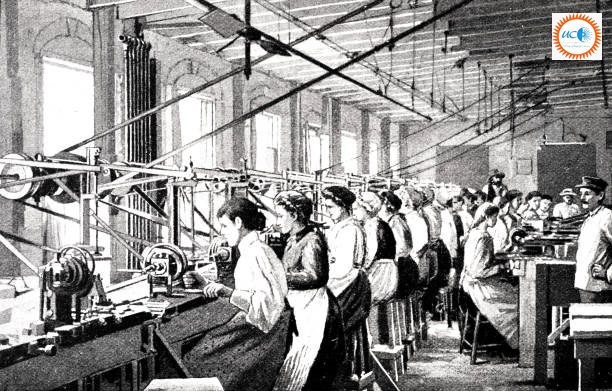Industrialisation led to the growth Colonisation and it helped in establishing British supremacy across the globe. Analyze. (150 Words)
Begin by
- Defining the terms Industrialisation and Colonisation
- Explain how Colonisation and Industrialisation were mutually complementary
- Conclude with the emergence of British hegemony in the political, economic, and cultural realm
Introduction
Industrialization refers to the emergence of machine-based production using inanimate power resources like steam or electricity.
Colonization, on the other hand, refers to the practice of acquiring colonies by conquest or other means and using them to serve its own economic and political interests.
Body
The industrial revolution was the force behind this New Imperialism, as it created not only the need for Europe to expand but the power to successfully take and profitably maintain so many colonies overseas thus came the role of colonization therein. Thus, the industrial revolution created the need for Europe to take over colonies around the world.
Industrialization led to
- the emergence of new ideas,
- Increase in scale of production.
- Development of modern equipment,
- Improvement in transportation and communication.
The first wave of colonization, during the Age of Exploration, was dominated by countries like Spain and Portugal. But in the second wave, with the pioneering start of the Industrial Revolution, Britain emerged as numero uno amongst colonizers.
Because the Industrial Revolution increased the production capacity of Western states astronomically, there was an enormous hunger for raw materials to satisfy demands. Thus, the Western powers sought colonies where raw materials were abundant and where they could be appropriated at little to no cost. Of course, their eyes were on Africa and Asia which were rich in oil, ivory, rubber, wood, cotton, cocoa beans, copper, gold, iron, cobalt, diamonds, etc.
India and Egypt were good sources of cotton, Congo and the East Indies, of rubber, other products needed were food grains, tea, coffee, indigo, tobacco, and sugar.
To obtain these, it was necessary to change the pattern of production in the countries where they could be grown.
Thus, the colonists forced the cultivation of only one or two crops that they needed as raw materials for their industries.
Later with the augmented scale of production, domestic markets got saturated and the surplus was diverted towards the colonies like India, turning them into markets.
Conclusion
Thus, the technical advantages of the Industrial Revolution gave the Europeans the belief that they are above the other races. Thus, this transformed into racism. As a consequence of this superiority, unremitting despotism came as a natural (or no compunction) form of control by the colonizers, which allowed them to profitably maintain so many colonies overseas. Thus, the industrial revolution helped the European countries accumulate more capital and become wealthier while subjugating the rest of the world under their control. Having this slavemaster relationship, vital resources were snatched away from them making their society crumble for life. This domination was not confined only to the political, economic, and military spheres. British culture, language, educational and administrative structure too enjoyed global prominence, making Britain a veritable global colonial power.





